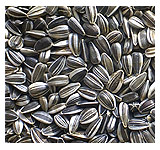Sunflower Seeds
Sunflower seeds taste great and are highly nutritious, making a healthy snack food. Interestingly, the sunflower seed is not really a seed at all but the fruit of the sunflower. Botanically-speaking, the fruit of the sunflower is properly referred to as an achene. An achene is a dried fruit produced by many species of flowering plants (sunflower included) as well as dandelions and rose hips. When you take the hull or shell off of the sunflower achene, you are left with the sunflower kernel. (But all we really need to know is that the inside is the tasty part!) You can purchase sunflower seeds in their shells, already dehulled for snacks and cooking. You can also purchase sunflower seeds for feeding birds, as it makes a great addition to a bird's diet. Without a doubt you have seen bags of sunflower seeds for sale, catering to either purpose.
Sunflower Seeds – Fruit of the Sunflower
 Sunflower seeds grow from the flowers in the centre of the head of the sunflower and are actually the means of sunflower reproduction, as each sunflower seed can be planted to grow into a new sunflower the following growing season. Each sunflower head can contain as many as 1000 to 2000 seeds. Sunflower seeds can be quite different when it comes to appearances, but the most common kind used for snacking has a black and white striped pattern on the hull. Other colours of seeds (such as white or black) are fully edible but are typically used for other purposes, such as for sunflower oil.
Sunflower seeds grow from the flowers in the centre of the head of the sunflower and are actually the means of sunflower reproduction, as each sunflower seed can be planted to grow into a new sunflower the following growing season. Each sunflower head can contain as many as 1000 to 2000 seeds. Sunflower seeds can be quite different when it comes to appearances, but the most common kind used for snacking has a black and white striped pattern on the hull. Other colours of seeds (such as white or black) are fully edible but are typically used for other purposes, such as for sunflower oil.
Sunflower Seeds - Uses
It is much more common to have sunflower seeds for a snack than as a main dish. Seeds are often used as garnishes on salads or as ingredients in other dishes. When eating in-shell as a snack, you crunch the hull off and eat the inside, since the outer shell is not edible. Before in-shell sunflower seeds are sold, they are further dried and processed in order to preserve the kernel. Dehulled kernels have already been processed in a machine to remove their hull. These kernels are sold raw or roasted, salted or unsalted. Similar to peanut butter, you can also buy sunflower butter to spread on toast or use in baking. As well, sunflower seeds are pressed to make sunflower oil, and you can learn about that in further detail on our sunflower oil page.
Sunflower Seeds – Birdseed
Another well-known use of sunflower in the U.S. is as birdseed, most often mixed with millet and other grains to round out the nutritional compostion of the mix. Black oil-seed varieties are typically favoured over striped seeds for feeding birds, since they cost less per pound. Sunflower seeds have a high oil content which helps provide an efficient energy resource for birds.
Sunflower seeds – Nutritional Info
| Sunflower seed kernels - dried Nutritional value per 100 g (3.5 oz) |
|||||||||||||||||||||||||||||||||||||||||
|---|---|---|---|---|---|---|---|---|---|---|---|---|---|---|---|---|---|---|---|---|---|---|---|---|---|---|---|---|---|---|---|---|---|---|---|---|---|---|---|---|---|
| Energy 570 kcal 2390 kJ | |||||||||||||||||||||||||||||||||||||||||
|
|||||||||||||||||||||||||||||||||||||||||
| Percentages are based on the US recommendations for adults. Source: USDA Nutrient database |
|||||||||||||||||||||||||||||||||||||||||